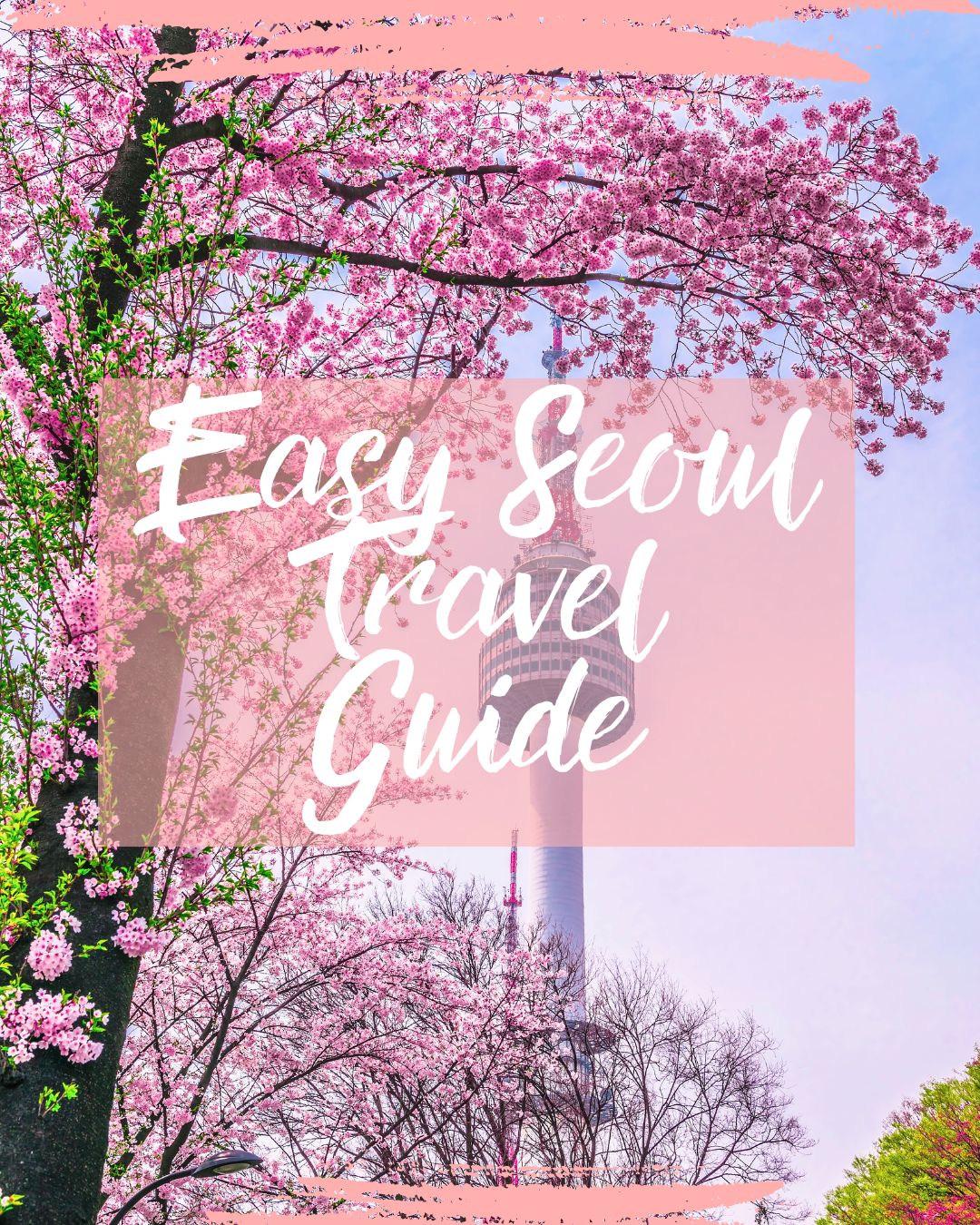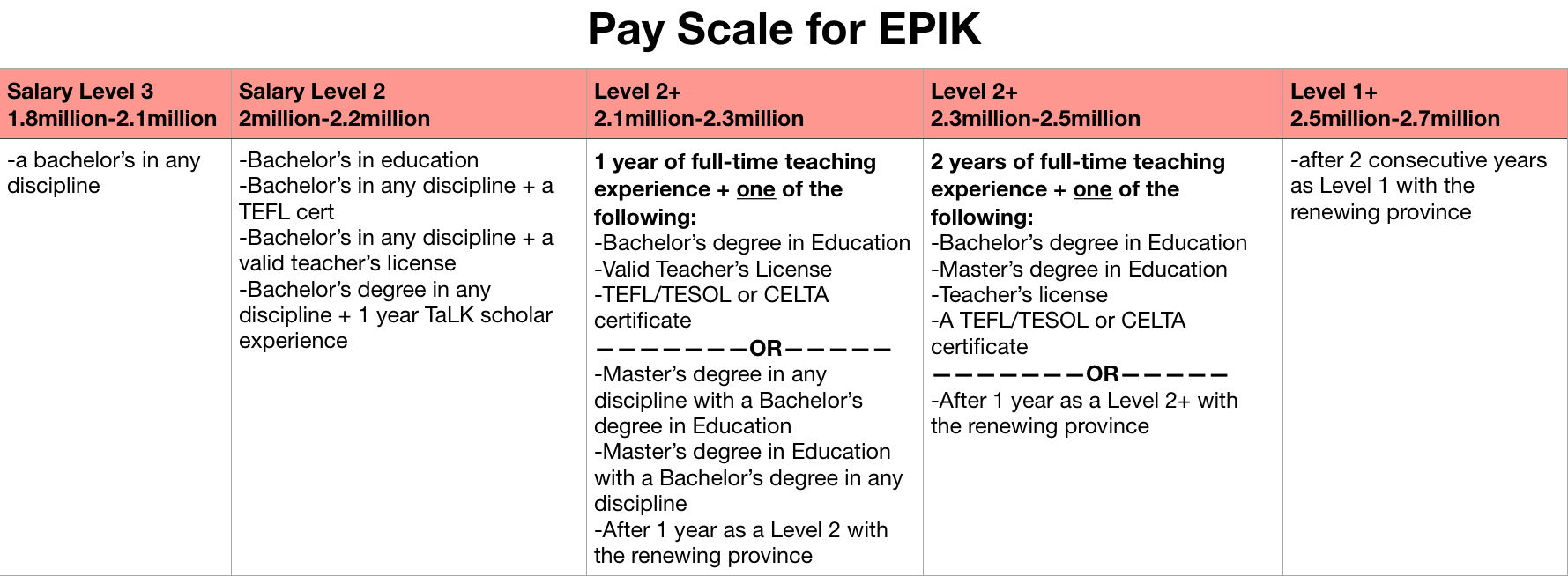Korea is kinda sorta the “IT” place to be in Asia. The Hallyu Wave is going nowhere and stronger than ever. While many are interested in this wonderful country for different reasons, it’s probably one of the best places for expats to live… And also hot spot for Kpop flower boys and girls. You get the memo. I know you all are just dying to know how to get a job teaching English in South Korea.
Anyway, one of the most common questions I get is how to get an English teaching job in South Korea. There’s lots of ways to go about coming to Korea, but I’m helping you out by doing the research for you and letting you know about the public school #thuglyfe. Because I know all the information out there can hurt your brain and make you want to head butt your desk.
Instead of charging you money for this info, I’m making this Goliath of a post I want to give you this info FO’ FREE cuz I love ya’ll so much. Seriously, I wouldn’t have had any success if some of you didn’t stick with me since my Gina Bear in Japan days. So as a thank you, I want to give you 15% off your TEFL certification. If you’re interested in teaching English in Korea, the first thing you need is that important little piece of paper. I’m currently working with International TEFL and TESOL Training Academy (ITTT) and classes start at $199. However, if you go through my link, it’ll be only be $165! Now that’s a win right there! Also, at no additional cost to you, I’ll make a small commission to keep running this site and bringing you more amazing content! 😉 Help a sista out if you wanna.
Now that’s enough shameless promotion so let’s get down to the nitty gritty of why you’re here. You’ve got a dream. You’re tired of the mundane life in your home country and you’ve decided to jump the broom, go for a change and life the #instagramlife everyone will be jelly for. Or you just need a change. Whatever your reason is, you’ve come across this post because you want a job. You can also explore other job opportunities in South Korea here.
Blog Posts You Might Like
- An Idiot’s Guide To Korean Apartments
- How To Study Korean With 90 Day Korean
- What’s it Really Like Living in South Korea?
Here are the key points in getting an English teaching job in South Korea:
- Why I Decided to Teach in South Korea
- Private School vs Public School
- Salary at a Public School
- Government Programs
- When to Apply
- Where to Find a Job
- The Interview
- Your Job Offer
Please note this blog post is mostly geared toward American applicants seeking a job in Korea.
Frequently Asked Questions
What requirements do I need to teach English in Korea?
In order to get your E-2 visa in Korea, you need to first apply for an English teaching position at a public or private school. The English teaching requirements for South Korea are as follows:
- An accredited bachelors degree from any institution in any subject.
- Be a citizen of the US, Canada, the UK, Ireland, Australia, South Africa or New Zealand. In recent years, South Korea started accepting Indian nationals as long as they have a license in teaching English. It depends on the institution if they will accept you or not.
- Pass a health examination and have a clean drug test.
- Have a spotless national criminal record in your home country.
These are the minimum requirements the Korean government outlines to be able to teach English in South Korea. Your employer may require additional information and paperwork.
What paperwork do I need to teach English in South Korea?
Paperwork blows no matter where you are in the world. Koreans LOVE their paperwork so be prepared to give them all the documents they want when they want them. And also bend over backwards to get additional documents or redo them.
When applying for my E-2 visa, you required to submit these documents to your nearest Korean consulate or Korean embassy:
- Your original University Diploma. (Make sure you order an extra one when you graduate.)
- An apostilled University diploma. To do so, you must go through a public notary and pledge your document isn’t falsified. Then you will send in the document to get apostilled.
- Unopened university transcripts. I highly recommend you order at least 10 or so when you graduate so you have that peace of mind and can provide them if you switch jobs in Korea or go to another country.
- Passport photos.
- Your original passport.
- Copy of your employment contract. This will be provided by your recruiter or your school if you applied directly through them.
- A clean national background check provided by the FBI.
Should I learn Korean before coming to Korea?
Yes, absolutely! Culture shock is a real thing and speaking from experience, it was not fun to be illiterate when I moved to Japan in 2012. Hangul is super easy to learn and you can download this FREE 90 minute Hangul cheat sheet to help you learn Korean in the span of an afternoon.
Why I Decided to Teach English in Korea
I started off my expat journey as a teacher on the Japan Exchange and Teaching (JET) Program. Ever since I was a snot nosed middle school student, my dream had always been to live, work, and experience Japan firsthand. My dream came true after I graduated Illinois State University with a Bachelor of Arts and I stepped foot in the country for the first time.
Was teaching in Japan a good decision? Absolutely. I got to live out my dream and learn about a country I was infatuated with since I was young.
But was moving to Korea to teach English the best idea ever? You bet your ass it was. There are so many pros to teaching English in South Korea. Some of my favorite include:
- free housing
- no experience needed (except a TEFL)
- lots of free travel opportunities for foreigners
- Koreans are pretty darn fun
- delicious food and thriving night life
- pay off my debts and save
- fast paced and technology forward
- you’ll become a global citizen
How did I decide Korea was the place for me? in 2014, Okinawa was getting under my skin so I took an impromptu trip with two of my favorite ladies on the planet. We came to Korea, I had the time of my life, and fell madly in love with the country. I had it bad for the food, people, fashion, makeup, and culture. So what’s a lovestruck girl to do? Obviously drop everything and hop across the pond from Japan.
So you’re probably like, “Yeah, Gina. We get you.” We’re so on the same boat, but some of you may have dire questions like—Is South Korea safe from North Korea? How much money will I make? Will I still be able to travel all over? What qualifications do you need to teach English in Korea?
That, my friend, is what I’m here to answer. I just want to give a disclaimer. GEPIK is now merging into EPIK. You can apply directly to EPIK through their website here. That means you will no longer be able to interview directly with a school and EPIK will place you where they see fit. You can still interview directly with a school by using a recruiting agency like Korvia, but if you apply directly into EPIK, you’re on your own ala Russian Roulette style. I also want to note, I was notified two months after moving to Korea that my middle school in Gunpo had lost funding. That means I had no option of renewal and had to go through the stressful process of finding another job.
Because so many people want to come to Korea these days, schools are becoming pickier. The falling birthrate and schools closing make it harder to get into Korea. (That doesn’t mean there aren’t any jobs. Trust me, there are plenty.) Since the government has realized what awesome benefits young foreign English teachers have, they’re also cutting back on those. For instance, this year, I was supposed to get 12 consecutive days of paid vacation, but that was instead cut to eight paid days, not including weekends. If you do the math, I lost two precious days and now have two additional desk warming days. I’m not gonna lie, it made me really sad and angry because my adventurous spirit doesn’t get enough paid time off.
Even though the government is slowly cutting back, don’t stop this from not letting you come to Korea. It’s a fantastic place to take a gap year, learn a new about a wonderful new country, save money, party, or travel to your heart’s content. Whatever your flavor is, I hope after reading this, you’ll be a bit more prepared and less anxious to start a brand new chapter in Korea.
Job Eligibility and Requirements
First things first. What is your eligibility and requirement to teach English in Korea? You must meet all of the following criterion.
- a valid passport from the USA, Canada, UK, Ireland, South Africa, Australia or New Zealand
- a bachelor’s degree in any subject (it doesn’t have to be English or teaching)
- background check with a clear record
- spotless health check (they want to be sure you’re not bringing crazy diseases in the country)
- TEFL certificate
If you just read this and you’re like for reals? I don’t need any previous teaching experience or need to speak Korean? That is correct, my friend. You don’t need it. Although like I said, schools are getting pickier and they would prefer someone with prior teaching experience.
Pro Tip: Before you come, learning hangul and the basics will make your life 10 times easier.
There’s loads of resources online, but I can highly recommend Korean Class 101. They have so many resources like lesson transcripts, placement tests, and vocabulary tests. They even send you a Korean word of the day in your email every day. I’m a hands on learner and Korean Class 101 helps me with the practicality, daily uses of language, and learning very quickly. Language is best when you can go about your daily life without hiccups. You can also download this FREE 90 minute Hangul cheat sheet here.
I get a lot of questions on my YouTube channel asking, “What if I’m not from the main English speaking countries? Can I still get a job?” In short, yes and no. I’ve had friends from European countries like France and Greece get English teaching jobs, but they’re at private academies called hagwon in Korean. As a public school teacher and having heard many hagwon horror stories, I don’t recommend going this route. Some people are at good hagwons but the majority are treated as slaves and replaceable. Go this route at your own peril.
Private School vs Public School
The first thing you need to ask yourself is if you want to work at a hagwon aka private academy or a public school. There are pros and cons to each so make sure you weigh your options and what matters to you the most.
Pros of a Hagwon
- classes are planned for you
- it’s easier to pick and choose where you live in Seoul
- higher pay
- higher level students (not all the time)
- elementary, middle, and high school available
- closer relationship with the students
- you can teach business English to corporate employees
- smaller class sizes
- more than one foreign teacher in the school
- higher chance of being hired because there’s more hagwon jobs
Cons of a Hagwon
- shady hagwons = shady business practices like firing you for no reason to avoid severance pay
- longer teaching hours like back to back classes and late working hours
- usually alone without the help of a Korean coteacher
- fewer holidays
- less paid time off
- it’s a business so business decisions outweigh educational ones
- discrimination based on race
I’ve only worked at public school, so this is my research based on what friends, other expats, and Google search have pointed me to. Some big hagwons offer their employees opportunities to be really immersed in traditional Korean work life. For example, if you’re doing a really good job, the big bosses will treat you to expensive Korean dinners and all expense paid for learning retreats in the countryside.
I’m not saying all hagwons discriminate but some discriminate when hiring. The people who get the brunt of this are the Korean Americans or Asian foreigners. The hagwons that discriminate typically want a foreigner who fits the bill of a stereotype (white, mid-twenties, North American). I’ve only worked at public school since I lived in Japan and in my personal opinion, I think it’s a safer option compared to a hagwon. This isn’t to say all hagwons suck because they don’t. Just do your research and check to see if the school was black listed before and then changed its name. One of the most popular sites to check is the Korean Black List. Like everything you see on the internet, take it with a grain of salt.
Pros of a Public School
- 26 days of paid leave per year
- job security because government contracts are gold
- you have a Korean coteacher to support you and manage the class
- you only focus on teaching and making lessons
- more vacation time
Cons of a Public School
- large class sizes
- disorganized
- boring text books
- difficult to find middle or high school jobs
- most public teaching contracts are in the countryside
One of the things I can’t stand about teaching in a public school is that I’m always the last to know everything. Most teachers will assume someone else told you (even though its your supervisor’s job) and sometimes you’ll know about schedule changes or you’ll get a surprise class. Make sure you have a back up lesson just in case. I was super lucky and to have jobs on the outskirts of Seoul, but a job like mine is super hard to come across. You get a lot more free time in a public school, but this can be a blessing or a curse. Which leads me to my next point.
Desk Warming (verb)– a principal delight (or horror) of ESL teachers in Korean (or Japanese) public schools, where they spend vast amounts of time at their desks, with no particular assignments or tasks to complete.
This will usually take place during summer and winter vacation. If you like sitting at school with nothing to do and getting paid to download dramas, play games or do whatever strikes your fancy. You’re going to love this. For someone like me, who would rather be traveling, this was a curse at times. Desk warming allowed me to work on my blog and grow my brand to what it is today. Pick your poison carefully when filling your time.
Salary at a Public School
Depending on your qualifications and your school, you will get paid accordingly. Below is a chart I made just for you highlights the requirements for each pay scale. This is based on the EPIk pay scale and will differ for GEPIK, SMOE, hagwons, and international schools. For each of these requirements, you will need one of the following criterion. You’re welcome. 😉
Government Programs
There are three different government programs you can go on. Each has their own benefits and downfalls. Choose which one rings your jingle bells the best. Right now there’s a gray area with GEPIK ad EPIK merging. Although Korvia still offers GEPIK contracts.
GEPIK
The acronym stands for Gyeonggi English Program in Korea. GEPIK is specifically for the Gyeonggi province which surrounds the Seoul area. Since I’ve been in Korea, I’ve only lived in Gyeonggi. This is one of the most popular teaching programs because you get the benefits of the Seoul subway system, the suburbs, and the proximity of Seoul. GEPIK makes it easy to live a comfortable yet active lifestyle.
EPIK
This program is for everywhere in Korea that isn’t Gyeonggi or Seoul. EPIK stands for English Program in Korea. If you really want to immerse yourself in Korean lifestyle and not be part of the city life, then this is the program for you. Also, if you’re in a really rural place, you’re entitled to 100,000 won more per month.
SMOE
The creme de la creme and the most sought after program in all of Korea. The Seoul Metropolitan Office of Education has also been cutting English teaching jobs over the past few years. Benefits have been getting worse and schools are getting pickier. Your salary will be a bit higher, but that’s to even out the costs of living in the big city.
Getting a position in a public school is a lot more rigorous and harder than it is for a hagwon. Teaching jobs are being cut as the years go by. Positions are usually first come, first serve so do your best to get your application in as quickly as possible.
When to Apply
Hagwons generally hire all year long, but if you want a public school, then the timeline is different. For a February start date, your application should be in by October 1st, and for a September start date, your application should be in by April 1st. The earlier you get your application in, the better your pickings will be. Do yourself a favor and don’t dawdle.
Where to Find a Job in South Korea
Here is a comprehensive list of all the recruiting agencies, websites, and Facebook groups you can go through to help you find a job. I’ve talked to other English teachers and asked their recommendations and these are the top picks.
Recruiting Agencies
- Korvia – I went through Korvia and highly recommend them. They really care about their recruits, throw social events for them to attend, and check in with them from time to time. Korvia really cares about placing teachers according to their preferences and will help as much as they can. They’ve been an official partner of all the government programs for 9 years so know you’re in good hands.
- Aclipse – Whether you want to teach ESL in Korea or China, they are dedicated to helping you find your ideal job. They primarily help recent college grads and seniors find jobs, but everyone is welcome to apply! Aclipse mostly recruits within the Chung Dahm (private academy) learning chain.
- Reach to Teach – They help place teachers in public and private schools in Korea and other countries around Asia. Reach to teach mostly places teachers on government programs so that way the teacher can be more secure.
- Ask now-ETO – I’ve heard great things about this agency. Their mission is to make sure you have the job you want, when you want, and where you want it. Ask now-ETO does their best to make sure your job is as fulfilling as it ought to be.
- We Teach Korea – The front page has all the most recent job openings so you can browse to your liking. A lot of schools in Korea hire last minute so this could be beneficial if you’re a procrastinator. You can submit a resume and they will also help you find a school that is the right fit.
- Say Kimchi Recruiting – Formed in 2009, their services are free to everyone. The staff has lived and taught in Korea; therefore, you can expect quality teaching jobs, application help, community support and a community website.
- CIEE – This website recruits for jobs not only in Korea but in many different countries in Asia. They will give you information like the salary, the benefits and when you should apply for jobs. This is an incredibly cool and interactive website.
Websites
- Dave’s ESL Cafe – This is probably one the most well known and oldest websites out there. They have many job postings in Korea including postings for university.
- Craigslist – I personally cannot vouch for the validity of Craigslist, but I know many foreigners have looked on this platform and gave successfully found jobs.
- Waygook – This site is gold if you’re teaching English in Korea. It’s great for lesson plans and resources as well as a job board. Personally, this is my teaching bible.
- Reddit – Alas, ye old Reddit. There’s a thread there specifically dedicated to English teaching positions in Korea.
Facebook Groups
The Interview
You will apply for these positions from your home in America by Skype or phone. Some schools require a second or third interview. Be prepared for a panel interview. Usually the English department will take part in this. Do your best to not give generic answers to everyone. Speak clearly because many older teachers have difficulty understanding spoken English sometimes. Most interviewers prefer a North American accent because these applicants are easier to understand. You’ll be asked general questions about teaching English in Korea. Some of these include:
- Please introduce yourself. (name, age, nationality, academic background)
- Why do you want to teach English in Korea?
- Explain your previous teaching experiences.
- Tell us about why you would be a good teacher.
Here are some other potential questions you could be asked as well. Do your best to try and come up with interesting responses.
- There are many different level students in English class. How do you deal with it?
- What are you classroom management techniques?
- What would you do about a student who is misbehaving in class?
- Have you ever been to Korea and do you know about Korean culture?
- What qualities do you have that will help you teach class?
- What kind of students do you like to work with?
- What type of students could you teach most effectively?
- How do you encourage students who are shy/new to English?
Make sure that at end of the interview you ask questions. If you don’t, it shows that you are uninterested in the position. You can ask about the level of the students, how many homerooms there are, and how many teacher in the department you will be working with.
Accepting Your Job Offer
Congratulations! You’ve picked a school, you’re confident in your decision and excited as a hyperactive gnat around a bowl of rotting fruit. Now what? According to your country and the arrangements they have made with Korea, you must follow the specific guidelines to acquiring your visa. Your recruiter should assist you with a checklist and help you during this process. No worries here because they’ve done this many times before.
Airfare
If you’re teaching at a public school, you will be required to pay for the ticket yourself and you will be reimbursed the stipulation according to the terms of your contract. You get about 1.3 million won for the flight and if you’re flight savvy, it’s easy to buy a cheap ticket and then pocket the rest of the money. So in a way, you’re kinda making money to enter Korea. 😉 You’re welcome for that tidbit.
Money
Before you come to Korea, I highly suggest you bring at least $2000 cash with you. While working, you need this to tide you over until you get your first paycheck. This money will help support you for food, transport, and anything else you might need for your apartment.
Contact the Previous Teacher
It’s always good to contact the teacher who was there before you so you can find out the ins and outs and what to expect from the school atmosphere. I was lucky enough that the foreign teacher at my second school was so sweet and helpful. I could contact her anytime on Kakaotalk and she would help me out. They will also have previous lessons that you can draw from and advice.
Accommodation
The majority of teaching contracts come with accommodation. Don’t accept a job that doesn’t provide housing or give you a housing allowance. In Korea, most people are required to put down a ridiculous amount of key money (5million won and up) in order to live at their apartments. The more money you put down, the cheaper your rent will be, but let me tell you, it is stressful to try and find your own housing and then put down all that money. Also, before you sign your contract, make sure that your apartment isn’t a sugar shack. Don’t accept some crappy housing either. Most schools will offer you a fully furnished studio apartment. Depending on where you live, you can have a bigger apartment (like I do). If you’re in Seoul, expect a small studio.
Settlement Allowance
My school provided me with a one time settlement allowance of 300,000 won. This was really helpful as I had to pay for my security deposit. For three months, I had to put down 300,000 won until I reached 900,000 won for the deposit. This is paid so just in case there is damage to the house, they can use that money to fix it.
Hopefully this goliath of a blog post will help you on job search journey in the Land of The Morning Calm. Korea is literally one of my favorite places on the planet and I hope you will like it as much as I do. Before I knew it, this place became second nature to me. I loved my life here, the night atmosphere, dating, and comfortable lifestyle. Don’t forget to grab your TEFL certificate for $165 so you can rock the English teaching game as easy as kimchi. And don’t forget to take advantage of this FREE 90 minute Hangul cheat sheet so you’re not super culture shocked and ahead of the game. See you on the flip side!
The following article contains affiliate links. This means if you choose to purchase through my links, I will make a small commission at no extra cost to you. These commissions help keep Gina Bear’s Blog running.

Free Seoul E-Book
Do you love South Korea?
Enter your name and email address and click the button below to receive your Easy Seoul Travel Guide so you can travel like a local!











Wow this was very nice and refreshing. Glad I found it, and I am also glad to see that u are a youtube, make sure to be on the look out for my user name, wusup panda commenting❤ best wishes
I enjoy reading your blog. Lots of good and helpful information. One question, while in Korea, is there a lot of that yellow dust I read about?
There is a lot of yellow dust in the late winter, spring, and early summer. In the late summer and autumn, the air quality is pretty good.
I have some college courses under my belt, I am currently in school for my BA in Aviation/Airport Management and Business. It is all online University so I can travel and attend class 🙂 But, can you still teach in Korea if all you have is the TEFL certificate?
I have always been attracted to South Korea, I find, like you, the Asian culture beautiful and interesting. I want to visit first and get a feel of South Korea, but I still want to get my TEFL and start getting the experience under my belt for after I get my BA that will help.
Any advice for either visiting, teaching without the BA, or what to prepare myself for once I do get my BA and teaching in Korea (around 2020-2021)?
It doesn’t matter what your major is, as long as you have a BA and a TEFL certificate. Hope this helps and good luck with everything!
Love your videos and Instagram posts! I saw on a video that sometimes they do not accept you or do not pay as much if you got your certificate online with no class experience. Is this possible for some schools?
Hey Gina..!This is a very informative article..!I was just wondering,since i am very interested in the subject and i am looking around for any information i can get and also living in a not native English speaking country,can you share the link perhaps of your friends social media or blogs that are from Europe..?Thank you..!